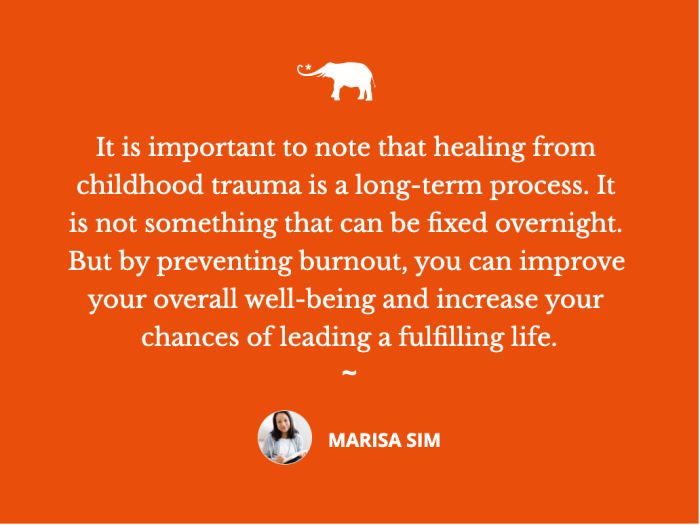Childhood trauma can have a profound and lasting impact on a person’s life, affecting everything from mental and physical health to relationships and career success. One of the most serious and debilitating effects of childhood trauma can be burnout, which can make it difficult to function in daily life and lead to other health problems.
This article will explore how childhood trauma can cause burnout and 8 ways to prevent it.
First, let’s define what we mean by childhood trauma. This can include any traumatic event during childhood, such as physical, emotional or sexual abuse, neglect, or exposure to violence. Trauma can also result from living in a chaotic or unstable environment, such as a home where there is substance abuse, neglect or domestic violence.
Growing up with a tiger mom meant I was often criticised and verbally and physically abused. It made me anxious and hypervigilant, I was in constant flight, fight or freeze mode. Mostly I would freeze and hope that the punishment would end soon. Because my mother would only show me love and acceptance when I was a “good” girl, I always tried to win her validation, which meant working hard to appease her—getting good grades and being good at sports and extracurricular activities. It was exhausting to be on high alert and be high performing constantly.
When a child experiences trauma, it can affect their developing brain in ways that make them more susceptible to burnout later in life. For example, trauma can lead to chronic stress, which can lead to an overactivation of the body’s stress response system. This can lead to an overproduction of cortisol, the hormone that regulates stress, which can have a negative impact on the body and mind.
Over time, chronic stress can take a toll on the body and mind, leading to physical and emotional exhaustion and a sense of hopelessness and despair. This can make it difficult to manage everyday tasks and lead to feelings of isolation and a sense of not belonging.
So, how can we prevent burnout if we have a history of childhood trauma? Here are eight ways to help:
- Seek professional help: If you have a history of childhood trauma, it’s important to seek professional help from a therapist or counsellor who can help you work through your experiences. Coaches can also help you develop healthier coping mechanisms to deal with the effects of trauma, including burnout.
- Practice self-care: Taking care of yourself is crucial in preventing burnout. This includes getting enough sleep, eating well, and doing regular physical activity. It also means setting aside time for yourself to relax and recharge daily.
- Build a support system: Surround yourself with people who understand and support you. This can include friends, family, and support groups specifically for people who have experienced childhood trauma.
- Learn to recognize triggers: Trauma can be triggered by certain situations, people or places. You can take steps to avoid or manage your triggers by learning to recognise them. Take deep breaths, count to 5 or name things in the room to calm the mind.
- Practice mindfulness and relaxation techniques: Mindfulness and relaxation techniques, such as meditation and yoga, can help to reduce stress and anxiety. Even 10 mins a day can have a huge impact on mental health.
- Connect with nature: Spending time in nature has positively impacted mental health.
- Find a hobby or activity you enjoy: Engaging in activities you enjoy can help you take your mind off your work and help you feel more positive and hopeful. I love cooking and taking walks in nature relaxes me.
- Be kind to yourself: Remember that healing from childhood trauma takes time, and being patient and kind to yourself is important.
In conclusion, childhood trauma can have a profound and lasting impact on a person’s life and can lead to burnout. By understanding how childhood trauma can cause burnout implementing self-care strategies, connecting with others and seeking professional help, individuals can take small steps to prevent burnout and improve their overall well-being.
It is important to note that healing from childhood trauma is a long-term process. It is not something that can be fixed overnight. But by preventing burnout, you can improve your overall well-being and increase your chances of leading a fulfilling life.
Remember to be patient with yourself, as it may take a while to unlearn the coping mechanisms that helped you survive your childhood trauma. Healing is a lifelong journey; it takes one small step to move on.
Download my free Self-Compassion journal here
 Share on bsky
Share on bsky




Read 0 comments and reply